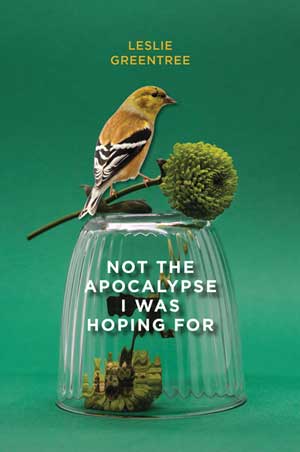Leslie Greentree has earned the honour of being shortlisted for the Griffin Prize, our country’s most prestigious poetry award. The Griffin jury praised Greentree’s conversational tone and the way she fearlessly tackles any subject head-on in an unpretentious, comic and charming fashion. The same praise applies to Greentree’s newest short-story collection, Not the Apocalypse I Was Hoping For.
This time the subject Greentree tackles head-on is death: the death of human connection, the death of meaning, the death of life as we have known it. Miraculously, these pages full of literal and metaphorical deaths are also full of humour and charm.
The collection is bookended by companion short stories, “Exit Interview #1” and “Exit Interview #2.” In the first story the narrator’s mother has turned her death into performance art, her final “Exit Interview.” From the first paragraphs, readers will admire this writer with a wit so sharp she can make death funny.
Perhaps, amid the grim news of 2022, Greentree’s sense of humour about mortality is exactly what we need. Her range of comedy is impressive, from the slapstick of Groucho Marx glasses on a corpse at a funeral to the shock of a female teacher sleeping with her high school student to the satire of self-indulgent artists to a quirky exploration of the relationship between booze and art to the tragicomedy of love in the internet age.
But, as a collection about apocalypses, this book is not all laughs. The characters in these stories are searching for meaning in contemporary existence, and Greentree’s knack for comedy often interweaves with an aching sorrow and emptiness at the heart of their lives. In the collection’s conclusion, a young man visits the “Exit Interview” performance art in the wake of a recent breakup (his own personal micro-apocalypse). His girlfriend dumped him via text. Even more hurtful, she changed her online relationship status five seconds later. Greentree’s social satire of “ghosting” culture and her portrayal of trying to find love in the age of social media are painfully accurate and insightful.
Mourning his relationship, the collection’s final protagonist reads these lines in the “Exit Interview” artist statement: “Death robs us of the opportunity to say goodbye—to hear the words we crave or to say the words that are stuck in our throats.” He feels the same way about his ex-girlfriend Ashley, realizing that she has robbed him of the opportunity to figure out what he’d done and how to fix it. The end happened too fast.
Kurt Vonnegut said that laughing and crying are essentially the same response. They’re what we do when we don’t know what else to do. In the prelude to our own apocalypse—coming too fast for us to fix—Greentree offers us both laughter and tears.
Angie Abdou is the author of This One Wild Life (2021).


